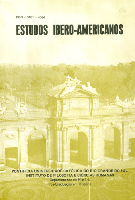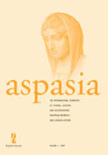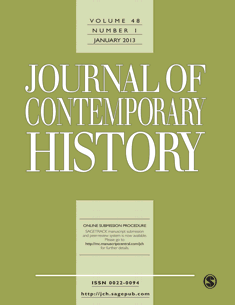
ESTUDOS IBERO-AMERICANOS
Scope & Guideline
Fostering Scholarly Dialogue in Ibero-America
Introduction
Aims and Scopes
- Interdisciplinary Historical Analysis:
The journal emphasizes the importance of interdisciplinary approaches to historical research, incorporating methodologies from sociology, anthropology, and cultural studies to analyze the complexities of Ibero-American societies. - Cultural Heritage and Memory Studies:
A core focus is on the preservation, interpretation, and critique of cultural heritage and collective memory, examining how these elements shape contemporary identities and political discourse in Ibero-American countries. - Political and Social Movements:
The journal publishes research on various political and social movements across Ibero-America, including discussions on authoritarianism, populism, and resistance, reflecting on their historical contexts and impacts. - Gender Studies and Feminist Historiography:
Gender relations and feminist perspectives are integral to the journal's scope, exploring women's roles in history, literature, and society, and how these intersect with broader socio-political issues. - Environmental and Geopolitical Issues:
Research focusing on environmental challenges and geopolitical dynamics is increasingly relevant, addressing the implications of colonialism, globalization, and contemporary ecological crises in the region.
Trending and Emerging
- Intersectionality in Gender Studies:
There is a growing emphasis on intersectionality within gender studies, exploring how various identities and social categories intersect to shape experiences and historical narratives in Ibero-America. - Environmental Justice and Activism:
Research focusing on environmental justice and activism has gained momentum, highlighting the role of indigenous communities and grassroots movements in advocating for sustainable practices and rights. - Digital Humanities and Public History:
The integration of digital humanities tools in historical research and the rise of public history initiatives are emerging themes, reflecting a broader interest in making history accessible and engaging to diverse audiences. - Transnational Perspectives on Migration:
Studies examining migration patterns and their socio-political implications are increasingly prevalent, addressing issues of identity, belonging, and the complexities of transnationalism in contemporary Ibero-American societies. - Cultural Memory and Trauma:
Explorations of cultural memory and trauma related to historical events, such as dictatorships and colonialism, are becoming more prominent, as scholars seek to understand their lasting impacts on contemporary identities and social dynamics.
Declining or Waning
- Traditional Narratives of Colonialism:
There has been a noticeable decrease in publications centered solely on traditional narratives of colonialism, as scholars increasingly seek to engage with postcolonial critiques and contemporary implications of historical events. - Economic History in Isolation:
Research focused on economic history as a standalone field has diminished, with a trend towards integrating economic analysis within broader social and cultural contexts, indicating a shift in how economic factors are discussed. - Narrowly Defined National Histories:
Studies that concentrate on narrowly defined national histories, without considering transnational or regional connections, are becoming less common, as scholars recognize the importance of interconnected histories in understanding Ibero-American experiences. - Classical Literary Analysis:
The journal has seen fewer articles dedicated solely to classical literary analysis, as interdisciplinary approaches that incorporate cultural studies and historical contexts gain more traction. - Historical Biographies:
There is a waning interest in traditional biographical studies that do not engage with broader historical narratives or social movements, suggesting a preference for research that contextualizes individual lives within larger frameworks.
Similar Journals

Historia y Memoria
Innovating Historical Perspectives for a Global AudienceHistoria y Memoria is a prominent open access journal in the field of history, published by UNIV PEDAGOGICA & TECNOLOGICA COLOMBIA in collaboration with the INST INVESTIG & FORMACION AVANZADA. With an ISSN of 2027-5137 and E-ISSN of 2322-777X, the journal has been disseminating valuable historical research since its transition to an open access format in 2010, ensuring that scholarly work is widely accessible to researchers, professionals, and students alike. Recognized for its academic rigor, Historia y Memoria is ranked in Q2 in the History category and holds a commendable Scopus rank of #651 out of 1760 in the Arts and Humanities – History category, placing it in the 63rd percentile. The journal focuses on exploring diverse narratives and methodologies in historical research, making it an essential resource for scholars seeking to deepen their understanding of historical dynamics, especially in the Colombian context. With a commitment to fostering academic dialogue and innovation, Historia y Memoria stands as a key publication for advancing historical scholarship.

Cadernos de Historia
Unveiling the Past, Inspiring the FutureCadernos de Historia, published by the Pontifícia Universidade Católica de Minas Gerais, is a pivotal open-access journal that has been enriching the field of historical studies since its inception in 2010. With an ISSN of 2237-8871, this journal provides a platform for innovative research and critical discourse in history, appealing to an audience of academics, researchers, and students alike. Located in Belo Horizonte, Brazil, the journal fosters international collaboration and dissemination of knowledge, ensuring that the latest findings in historical research are accessible to a global community. While the journal’s HIndex is currently not specified, its commitment to scholarly excellence is evident through its rigorous peer-review process. Cadernos de Historia stands out as a vital resource for those engaged in the study of historical narratives, methodologies, and interdisciplinary approaches, making it an essential addition to any historian's collection.

Estudos Historicos
Fostering Global Dialogue in Historical and Cultural Studies.Estudos Historicos, an esteemed academic journal published by FUNDACAO GETULIO VARGAS-FGV, is a pivotal platform for scholars in the fields of History, Cultural Studies, and Literature. With a focus on contemporary historical discourse and interdisciplinary approaches, this Open Access journal has been fostering scholarly dialogue since 2009, ensuring that vital research is accessible to a global audience. Based in Brazil, it holds impressive rankings, notably within the top tier of the Scopus database, where it is positioned in the 88th percentile for Literature and Literary Theory and the 75th percentile for History. The journal also boasts a Q1 categorization in Literature and Literary Theory, reflecting its commitment to high-quality scholarship. With its comprehensive scope, Estudos Historicos plays a crucial role in shaping the understanding of historical contexts and cultural narratives, appealing to researchers, professionals, and students alike who seek to explore the intersections of history, society, and literature.

Aspasia
Fostering critical dialogue in gender studies.Aspasia is a distinguished open-access journal dedicated to the fields of Gender Studies and History, published by BERGHAHN JOURNALS and based in the United Kingdom. Since its inaugural issue in 2011 and achieving open access in 2019, Aspasia has committed to providing a platform that explores diverse scholarly perspectives on women's experiences and gender dynamics within historical contexts. With an impact factor reflective of its rigorous peer-review process, Aspasia has achieved notable rankings, including Q4 in Gender Studies and Q3 in History for 2023, indicating its growing influence within these disciplines. The journal is indexed in prominent databases, showcasing its relevance and contribution to ongoing academic discourse. Researchers, professionals, and students are encouraged to explore its rich content, fostering critical dialogue and advancing knowledge in the understanding of gender and historical narratives.

Antiteses
Empowering Research with Unrestricted AccessAntiteses is a distinguished academic journal published by UNIV ESTADUAL LONDRINA, serving as an indispensable platform for scholarly discourse in the humanities and social sciences. With an ISSN of 1984-3356 and an E-ISSN matching the same number, this peer-reviewed journal has embraced the Open Access model since 2008, ensuring that cutting-edge research is readily available to researchers, professionals, and students globally, thereby fostering an inclusive academic community. Antiteses aims to explore critical discourses across various domains, encouraging innovative thoughts and discussions that challenge conventional paradigms. Located in Londrina, Paraná, Brazil, the journal maintains its commitment to high academic standards, although specific metrics such as H-Index or impact factor remain to be established. Its open-access nature aligns with contemporary trends towards equitable access to knowledge, making it a vital resource for those invested in the evolution of academic thought.

Revista de Historia-Sao Paulo
Illuminating the Past, Inspiring Future Inquiry.Revista de Historia-Sao Paulo, an esteemed academic journal published by UNIV SAO PAULO, FAC FILOSOFIA LETRAS & CIENCIAS HUMANAS, has been a key platform for historical research since its inception in 1950, offering open access to a diverse array of scholarly articles. Based in Brazil, this journal delivers a critical perspective on historical studies, contributing to the broader discourse within the field. With an ISSN of 0034-8309 and an E-ISSN of 2316-9141, it has established a notable presence in academia, ranking within the Q2 quartile for its contributions to history as of 2023. The journal's impact is underscored by its inclusion in Scopus, with a rank of 1103/1760 in the Arts and Humanities category. Covering converged years that span from 1968 to 2024, the journal caters to a wide scholarly community and facilitates the dissemination of pioneering research. Its commitment to making historical resources accessible accentuates its relevance and importance to researchers, professionals, and students alike.

Historia-Santiago
Connecting Researchers Globally Through Open Historical InquiryHistoria-Santiago is an esteemed academic journal published by the Pontificia Universidad Católica de Chile, Instituto de Historia. Since its inception in 2000, the journal has embraced an Open Access model, facilitating broad dissemination of historical research and ensuring that critical scholarly work is freely accessible to researchers, professionals, and students around the globe. With a focus on Latin American history, Historia-Santiago provides a platform for innovative research and contributions that engage with diverse historical narratives and methodologies. The journal aims to foster interdisciplinary dialogue and stimulate scholarly debate, thereby enriching the understanding of historical contexts and their implications in contemporary society. By maintaining high academic standards, Historia-Santiago occupies a vital role in the field of historical studies, encouraging authors to explore new ideas and perspectives that shape the understanding of our past.

JOURNAL OF CONTEMPORARY HISTORY
Exploring the Nexus of Past and PresentJOURNAL OF CONTEMPORARY HISTORY, published by SAGE PUBLICATIONS LTD, is a premier academic journal dedicated to the exploration of modern historical narratives and contemporary societal issues. Established in 1966, this journal has influenced scholarly discourse through a rich repository of research, analyses, and critical reflections, providing invaluable insights into cultural studies, sociology, and political science. With an impressive Q1 ranking in History and a notable Q2 ranking in Cultural Studies for 2023, it stands out in the academic community, ensuring rigorous peer-reviewed content that meets the highest scholarly standards. The journal is accessible through conventional subscriptions, reflecting its long-standing commitment to academic excellence. Based in the United Kingdom, it continues to serve as an indispensable resource for researchers, professionals, and students alike, bridging the gap between historical context and contemporary relevance.

Lusotopie
Exploring the Rich Tapestry of Lusophone CulturesLusotopie is a distinguished academic journal dedicated to the exploration of cultural, social, and political dynamics in Lusophone societies, providing a pivotal platform for researchers and scholars in the fields of anthropology, history, and cultural studies. Published by Lusotopie, the journal features contributions that foster a deeper understanding of the linguistic, historical, and cultural connections across Portuguese-speaking communities, making it an essential resource for academics and professionals alike. With its ISSN 1257-0273 and E-ISSN 1768-3084, the journal aims to bridge interdisciplinary gaps while promoting critical discourse in the study of Lusophone regions. Although Lusotopie does not operate under an open access model, it remains committed to enhancing scholarly dialogue and disseminating significant research findings. The journal has cultivated a reputation for publishing quality articles, researched during its active years since 1999, thereby securing its place as an important contributor to the academic landscape of Mediterranean studies. Researchers, professionals, and students interested in the cultural intricacies and sociopolitical issues facing the Lusophone world will find Lusotopie an invaluable resource.

Vestnik Tomskogo Gosudarstvennogo Universiteta Istoriya-Tomsk State University Journal of History
Engaging with the Rich Tapestry of Regional HistoriesVestnik Tomskogo Gosudarstvennogo Universiteta Istoriya - Tomsk State University Journal of History is a prominent academic journal that focuses on advancing the field of historical studies with a particular emphasis on Russian and Siberian historiography. Published by TOMSK STATE UNIVERSITY, this journal aims to provide a platform for the dissemination of innovative research, critical analyses, and scholarly discussions among historians, researchers, and students. With its ISSN 1998-8613 and E-ISSN 2311-2387, the journal is committed to fostering an accessible scholarly community, although it currently does not operate under an Open Access model. By featuring works that engage with various narratives and methodologies, Vestnik Tomskogo Gosudarstvennogo Universiteta Istoriya plays a vital role in enriching academic dialogue and contributing to the ever-evolving understanding of historical contexts, particularly in relation to regional studies. This journal is an essential resource for anyone interested in delving into the complexities of history, culture, and society.